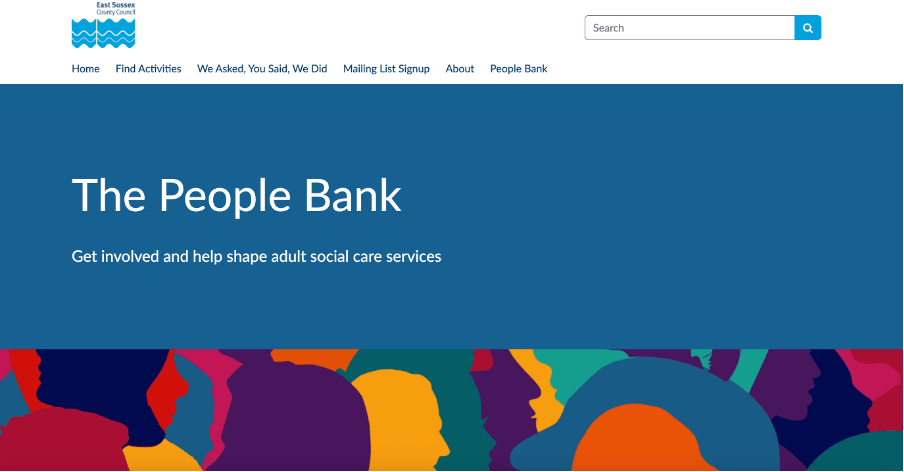
Citizen feedback is one of the most powerful resources governments have in policymaking.
While civil servants have the technical expertise in their field, it’s local people who have first-hand experience of service quality and availability. So, when governments collaborate with citizens, they get pinpoint recommendations on where changes are needed and funds can be spent best.
That’s local democracy in action — and done right, it means we all get efficient, high-quality, and popular local government services.
Today, we’ll look at a shining example of citizen collaboration: East Sussex County Council’s People Bank initiative (seriously, go click that link).
How East Sussex Involved Citizens In Local Government Services
East Sussex takes a fairly unique approach, extending beyond one-way info sharing and consultation, towards a system that invites local people to shape exactly how feedback initiatives are run. This is called ‘co-production’, and it’s great because it makes contributors feel valued for their input.
Co-production has enabled the East Sussex Social Care team to create a highly engaged group of 150 local contributors. They have an online space where they can reach people, gather opinions, and publicly commit to citizen-led programs of work. People Bank members don’t feel ignored; they can see citizen recommendations at play in every survey, activity, or impact report they engage with. Local governments around the world could benefit from achieving this level of community trust.
The People Bank is built on Citizen Space, the citizen engagement tool trusted by 1000s of decision-making bodies. Keep reading to see how East Sussex puts co-production into action using our platform, and the lessons that we can all learn from their approach…
Safeguarding local interests

Did you know that less than 1 in 5 people in the UK take part in public consultations on local government services or issues?
Public consultation has historically been stereotyped as cumbersome, bureaucratic, and unrepresentative of society’s views at large. People may not be aware when events are ongoing, don’t have time to participate, or worse, have little faith that their opinion will actually be listened to. It’s telling that the most deprived communities are the least likely demographic to engage.
So, government clearly needs a better understanding of the drivers and hurdles in public engagement. That way, they can encourage more responses from stakeholders — including residents, charities, carers, service users, and the wider community — and maximise the quality of feedback regarding local government services.
The Social Care team at East Sussex County Council’s Drug and Alcohol support service survey found several noteworthy observations on what influences user engagement in their consultation:
- Those with lived experiences of addiction harms have valuable views to share but may have been discouraged by the particular wording or absence of questions
- Some may have been discouraged from participating if wasn’t made clear that responses are anonymous
- People may have felt unable to contribute where they had no personal experience of drugs or alcohol (and the relevant support services), especially if resources weren’t readily available to them
Co-production in action

Admittedly, it’s hard for governments to know exactly what issues their constituents may face when filling out a survey. Even subject matter experts get tunnel vision, so it helps to have holistic feedback on local government services, from people who weren’t directly involved in creating the consultation initiative.
Enter the People Bank’s ‘co-production’ model for local government services.
Their approach calls for survey user-testing before a consultation page is released to the wider public. Here, the role of the end user is to perform a sense-check on surveys. This involves critiquing how questions are worded, suggesting sections to add or drop, and proposing contextual information to be provided alongside it.
The idea is that public engagement strategies can be refined and improved when subject to impartial feedback. When citizens are involved in co-production, it means surveys are more socially aware and welcoming to engage with, and less likely to be affected by bias.
For instance, in East Sussex’s NHS Health Check feedback survey, a People Bank member was asked to user test the consultation page, and they offered several suggestions for improvements. These changes were deliberated on by the council, and many were accepted in the final version sent out to local residents.
The impact report for East Sussex’s NHS Health Check Feedback survey
Building transparency and trust
Once the results of co-produced surveys have been gathered, it’s important for the public body to be clear on how and why these changes were made. This is about more than simply informing citizens; it’s about building a foundational trust that’s so crucial for participation in local governance.
In line with the ‘We Asked, You Said, We Did’ framework, East Sussex County Council provides additional resources and detailed impact reports of their user-testing for every survey. These reports act as evidence of how citizen engagement impacted co-production, with a direct link from the consultation page for all to see. This helps build a sense of community and accountability, while at the same time respecting individual anonymity.
East Sussex also ensures that all People Bank members have the autonomy to decide how much or how little they wish to be involved. For example, they run in-person events like public meetings, as well as send out newsletters in either paper or email format, according to individual preferences. That way, everyone is kept in-the-loop about ongoing consultations (effective at prompting responses) and their autonomy is respected (ensuring they don’t disengage).
The impact report for People Bank’s Linked Alarm survey
One hub for community organisation

A core aim of any online public consultation platform is to make surveys, resources, and impact reports accessible to everyone. We call this ‘informing at the point of response’, in that a user shouldn’t need to know anything before they visit your online hub and fill out a survey.
In terms of your community webpage design, people should be able to absorb information at a glance and easily find links to the right sub-pages. Levels of computer literacy can vary enormously among the general public, so it’s important to stick to web content accessibility guidelines.
Take another look at the People Bank’s online hub (pictured below) as an example that does it really well. Their Citizen Space Project Page organises everything in one place, with links to ongoing/historical projects, their mission statement, plus explainers like ‘how to get involved’. It tells a compelling story about social care in East Sussex and the good work that People Bank members are doing.
Project pages make it easier for everyone — civil servants, local officials and citizens alike — to track the lifecycle of a project from initial consultation through feedback, impact reports, and subsequent follow-up consultations to eventual changes. The standard Citizen Space subscription lets you create one community page from three standard template types. If you’d like to be able to create more than one page, or need a custom design, please contact us and we’ll get you set up.
The future of public engagement
It’s no secret that governments face enormous financial pressures when crafting policies for communities — whether that’s to do with social care provision, local development plans, sustainability targets, or anything else.
Instead of disengaging from those that they’re meant to represent, it’s time for governments to give citizens more of a say in how their money is spent on local government services. With access to enriched feedback, services can be run cost-effectively to fulfil everyone’s needs.
This is why East Sussex County Council have done an outstanding job in creating the People Bank; a community of 150 people who give incredibly valuable continuing feedback. Their model for survey co-production is truly a Citizen Space success story, and we’d love to see other local governments pursue similar models for citizen collaboration.
The collective wisdom of communities paves the way for better policymaking. Everyone has a valuable opinion to share, so it’s up to governments to share, listen, and collaborate.
